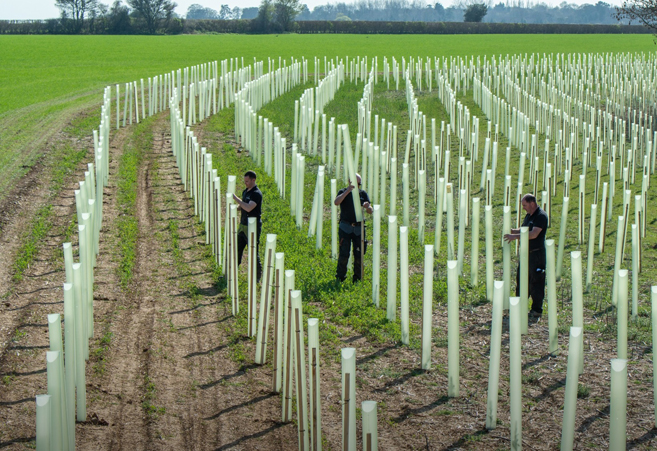Grass Routes is all about the long term canvass using the estate to help connect communities in a more efficient and environmentally friendly way. With a series of permissive paths and cycle ways linking the villages around the estate it also helps shape future development away from continued sprawl.
“Our neighbouring towns and villages, within which we are a major holder of property, are beautiful places, but are seen largely in isolation. Connectivity is poor; links to railways are haphazard, cycle networks are inconsistent and footpaths do not join up. As a result, four out of five journeys in our area are by car. In a world where climate change is centre stage
improved connectivity will not only be key to the property we hold, but also that which we build,” Roy says.
Of the five initiatives Natural Balance and Landed Gently are perhaps the most relatable for smaller estates that can’t offer the same scale and levels of public access as Blenheim, but will be looking for new sources of income as the Basic Payment Scheme is gradually phased out.
"Natural Balance is a new model of valuing our natural capital; an innovative way to attribute the benefits of good air, water, soil, woodland, green spaces and biodiversity to the total ecosystem, and so to generate new income streams and promote the best long-term decisions.
We want to be the first generation to truly leave this land in a better state than it was found. We are already seeing these principles work their way into legislation and this is how future generations will measure us,” Roy explains.
Landed Gently takes things further and is more ambitious. “This is the long-term change in a world where many are looking from the outside at landed estates. For many reasons the way we manage land cannot continue in perpetuity – it will deplete one of our greatest assets. We will use the lessons of natural capital to first become carbon-neutral. Then we want to go further, to demonstrate carbon-negative land management,” he says.

“There is no commonly agreed ‘one best’ sustainable practice amongst farming methods such as regenerative, agroforestry, and organic. We are working with partners who can guide us on this journey, and together we will find the best mix, or model, that proves effective for our long-term asset,” Roy adds.
Given the food-chain issues seen during the Covid-19 crisis and a growing demand for local food, Acorns & Oaks seems particularly pertinent at the current time.
“Blenheim stands for three centuries of caring for the land. As we have shown with our bottled spring water, we can do more to translate that legacy of care into great tasting local produce, that also spurs local business vitality,” emphasises Roy.
"By partnering with producers and artisans who share our values – not putting labels on jam jars ourselves – we can bring our unique provenance from the land to the larder. Game, botanicals, grains, even grapes can become charcuterie, gin, read, wine and beer.”
Some might see the five initiatives as philanthropic, but Roy stresses that safeguarding the future of Blenheim lies at
their core.
“This is not a social experiment. When we get these right, this part of Oxfordshire becomes a destination with
opportunities to live, work and prosper, all three of which are vital to any landed estate as an employer, holder of property or rooted in its local community. No more so is that evident than during the current crisis.”
All things that Knight Frank hopes our own Five Cs will also deliver.